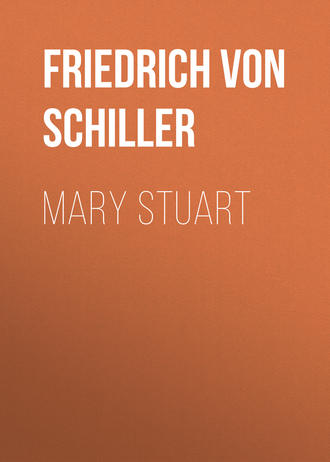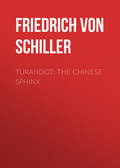полная версия

Фридрих Шиллер
Mary Stuart
SCENE IV
Enter SIR AMIAS PAULET and MORTIMER.
ELIZABETH
There's Sir Amias Paulet; noble sir,
What tidings bring you?
PAULET
Gracious sovereign,
My nephew, who but lately is returned
From foreign travel, kneels before thy feet,
And offers thee his first and earliest homage,
Grant him thy royal grace, and let him grow
And flourish in the sunshine of thy favor.
MORTIMER (kneeling on one knee)
Long live my royal mistress! Happiness
And glory from a crown to grace her brows!
ELIZABETH
Arise, sir knight; and welcome here in England;
You've made, I hear, the tour, have been in France
And Rome, and tarried, too, some time at Rheims:
Tell me what plots our enemies are hatching?
MORTIMER
May God confound them all! And may the darts
Which they shall aim against my sovereign,
Recoiling, strike their own perfidious breasts!
ELIZABETH
Did you see Morgan, and the wily Bishop
Of Ross?
MORTIMER
I saw, my queen, all Scottish exiles
Who forge at Rheims their plots against this realm.
I stole into their confidence in hopes
To learn some hint of their conspiracies.
PAULET
Private despatches they intrusted to him,
In cyphers, for the Queen of Scots, which he,
With loyal hand, hath given up to us.
ELIZABETH
Say, what are then their latest plans of treason?
MORTIMER
It struck them all as 'twere a thunderbolt,
That France should leave them, and with England close
This firm alliance; now they turn their hopes
Towards Spain —
ELIZABETH
This, Walsingham hath written us.
MORTIMER
Besides, a bull, which from the Vatican
Pope Sixtus lately levelled at thy throne,
Arrived at Rheims, as I was leaving it;
With the next ship we may expect it here.
LEICESTER
England no more is frightened by such arms.
BURLEIGH
They're always dangerous in bigots' hands.
ELIZABETH (looking steadfastly at MORTIMER)
Your enemies have said that you frequented
The schools at Rheims, and have abjured your faith.
MORTIMER
So I pretended, that I must confess;
Such was my anxious wish to serve my queen.
ELIZABETH (to PAULET, who presents papers to her)
What have you there?
PAULET
'Tis from the Queen of Scots.
'Tis a petition, and to thee addressed.
BURLEIGH (hastily catching at it)
Give me the paper.
PAULET (giving it to the QUEEN)
By your leave, my lord
High-treasurer; the lady ordered me
To bring it to her majesty's own hands.
She says I am her enemy; I am
The enemy of her offences only,
And that which is consistent with my duty
I will, and readily, oblige her in.
[The QUEEN takes the letter: as she reads it MORTIMER and LEICESTER speak some words in private.
BURLEIGH (to PAULET)
What may the purport of the letter be?
Idle complaints, from which one ought to screen
The queen's too tender heart.
PAULET
What it contains
She did not hide from me; she asks a boon;
She begs to be admitted to the grace
Of speaking with the queen.
BURLEIGH
It cannot be.
TALBOT
Why not? Her supplication's not unjust.
BURLEIGH
For her, the base encourager of murder;
Her, who hath thirsted for our sovereign's blood,
The privilege to see the royal presence
Is forfeited: a faithful counsellor
Can never give this treacherous advice.
TALBOT
And if the queen is gracious, sir, are you
The man to hinder pity's soft emotions?
BURLEIGH
She is condemned to death; her head is laid
Beneath the axe, and it would ill become
The queen to see a death-devoted head.
The sentence cannot have its execution
If the queen's majesty approaches her,
For pardon still attends the royal presence,
As sickness flies the health-dispensing hand.
ELIZABETH (having read the letter, dries her tears)
Oh, what is man! What is the bliss of earth!
To what extremities is she reduced
Who with such proud and splendid hopes began!
Who, called to sit on the most ancient throne
Of Christendom, misled by vain ambition,
Hoped with a triple crown to deck her brows!
How is her language altered, since the time
When she assumed the arms of England's crown,
And by the flatterers of her court was styled
Sole monarch of the two Britannic isles!
Forgive me, lords, my heart is cleft in twain,
Anguish possesses me, and my soul bleeds
To think that earthly goods are so unstable,
And that the dreadful fate which rules mankind
Should threaten mine own house, and scowl so near me.
TALBOT
Oh, queen! the God of mercy hath informed
Your heart; Oh! hearken to this heavenly guidance.
Most grievously, indeed, hath she atoned.
Her grievous crime, and it is time that now,
At last, her heavy penance have an end.
Stretch forth your hand to raise this abject queen,
And, like the luminous vision of an angel,
Descend into her gaol's sepulchral night.
BURLEIGH
Be steadfast, mighty queen; let no emotion
Of seeming laudable humanity
Mislead thee; take not from thyself the power
Of acting as necessity commands.
Thou canst not pardon her, thou canst not save her:
Then heap not on thyself the odious blame,
That thou, with cruel and contemptuous triumph,
Didst glut thyself with gazing on thy victim.
LEICESTER
Let us, my lords, remain within our bounds;
The queen is wise, and doth not need our counsels
To lead her to the most becoming choice.
This meeting of the queens hath naught in common
With the proceedings of the court of justice.
The law of England, not the monarch's will,
Condemns the Queen of Scotland, and 'twere worthy
Of the great soul of Queen Elizabeth,
To follow the soft dictates of her heart,
Though justice swerves not from its rigid path.
ELIZABETH
Retire, my lords. We shall, perhaps, find means
To reconcile the tender claims of pity
With what necessity imposes on us.
And now retire.
[The LORDS retire; she calls SIR EDWARD MORTIMER back.
Sir Edward Mortimer!
SCENE V
ELIZABETH, MORTIMER.
ELIZABETH (having measured him for some time with her eyes in silence)
You've shown a spirit of adventurous courage
And self-possession, far beyond your years.
He who has timely learnt to play so well
The difficult dissembler's needful task
Becomes a perfect man before his time,
And shortens his probationary years.
Fate calls you to a lofty scene of action;
I prophesy it, and can, happily
For you, fulfil, myself, my own prediction.
MORTIMER
Illustrious mistress, what I am, and all
I can accomplish, is devoted to you.
ELIZABETH
You've made acquaintance with the foes of England.
Their hate against me is implacable;
Their fell designs are inexhaustible.
As yet, indeed, Almighty Providence
Hath shielded me; but on my brows the crown
Forever trembles, while she lives who fans
Their bigot-zeal, and animates their hopes.
MORTIMER
She lives no more, as soon as you command it.
ELIZABETH
Oh, sir! I thought I saw my labors end,
And I am come no further than at first,
I wished to let the laws of England act,
And keep my own hands pure from blood's defilement.
The sentence is pronounced – what gain I by it?
It must be executed, Mortimer,
And I must authorize the execution.
The blame will ever light on me, I must
Avow it, nor can save appearances.
That is the worst —
MORTIMER
But can appearances
Disturb your conscience where the cause is just?
ELIZABETH
You are unpractised in the world, sir knight;
What we appear, is subject to the judgment
Of all mankind, and what we are, of no man.
No one will be convinced that I am right:
I must take care that my connivance in
Her death be wrapped in everlasting doubt.
In deeds of such uncertain double visage
Safety lies only in obscurity.
Those measures are the worst that stand avowed;
What's not abandoned, is not wholly lost.
MORTIMER (seeking to learn her meaning)
Then it perhaps were best —
ELIZABETH (quick)
Ay, surely 'twere
The best; Oh, sir, my better angel speaks
Through you; – go on then, worthy sir, conclude
You are in earnest, you examine deep,
Have quite a different spirit from your uncle.
MORTIMER (surprised)
Have you imparted then your wishes to him?
ELIZABETH
I am sorry that I have.
MORTIMER
Excuse his age,
The old man is grown scrupulous; such bold
Adventures ask the enterprising heart
Of youth —
ELIZABETH
And may I venture then on you —
MORTIMER
My hand I'll lend thee; save then as thou canst
Thy reputation —
ELIZABETH
Yes, sir; if you could
But waken me some morning with this news
"Maria Stuart, your bloodthirsty foe,
Breathed yesternight her last" —
MORTIMER
Depend on me.
ELIZABETH
When shall my head lie calmly down to sleep?
MORTIMER
The next new moon will terminate thy fears.
ELIZABETH
And be the selfsame happy day the dawn
Of your preferment – so God speed you, sir;
And be not hurt, if, chance, my thankfulness
Should wear the mask of darkness. Silence is
The happy suitor's god. The closest bonds,
The dearest, are the works of secrecy.
[Exit
SCENE VI
MORTIMER (alone).
Go, false, deceitful queen! As thou deludest
The world, e'en so I cozen thee; 'tis right,
Thus to betray thee; 'tis a worthy deed.
Look I then like a murderer? Hast thou read
Upon my brow such base dexterity?
Trust only to my arm, and keep thine own
Concealed – assume the pious outward show
Of mercy 'fore the world, while reckoning
In secret on my murderous aid; and thus
By gaining time we shall insure her rescue.
Thou wilt exalt me! – show'st me from afar
The costly recompense: but even were
Thyself the prize, and all thy woman's favor,
What art thou, poor one, and what canst thou proffer?
I scorn ambition's avaricious strife,
With her alone is all the charm of life,
O'er her, in rounds of endless glory, hover
Spirits with grace, and youth eternal blessed,
Celestial joy is throned upon her breast.
Thou hast but earthly, mortal goods to offer —
That sovereign good, for which all else be slighted,
When heart in heart, delighting and delighted;
Together flow in sweet forgetfulness; —
Ne'er didst thou woman's fairest crown possess,
Ne'er hast thou with thy hand a lover's heart requited.
I must attend Lord Leicester, and deliver
Her letter to him – 'tis a hateful charge —
I have no confidence in this court puppet —
I can effect her rescue, I alone;
Be danger, honor, and the prize my own.
[As he is going, PAULET meets him.
SCENE VII
MORTIMER, PAULET.
PAULET
What said the queen to you?
MORTIMER
'Twas nothing, sir;
Nothing of consequence —
PAULET (looking at him earnestly)
Hear, Mortimer!
It is a false and slippery ground on which
You tread. The grace of princes is alluring,
Youth loves ambition – let not yours betray you.
MORTIMER
Was it not yourself that brought me to the court?
PAULET
Oh, would to God I had not done as much!
The honor of our house was never reaped
In courts – stand fast, my nephew – purchase not
Too dear, nor stain your conscience with a crime.
MORTIMER
What are these fears? What are you dreaming of?
PAULET
How high soever the queen may pledge herself
To raise you, trust not her alluring words.
[The spirit of the world's a lying spirit,
And vice is a deceitful, treacherous friend.]
She will deny you, if you listen to her;
And, to preserve her own good name, will punish
The bloody deed, which she herself enjoined.
MORTIMER
The bloody deed! —
PAULET
Away, dissimulation! —
I know the deed the queen proposed to you.
She hopes that your ambitious youth will prove
More docile than my rigid age. But say,
Have you then pledged your promise, have you?
MORTIMER
Uncle!
PAULET
If you have done so, I abandon you,
And lay my curse upon you —
LEICESTER (entering)
Worthy sir!
I with your nephew wish a word. The queen
Is graciously inclined to him; she wills
That to his custody the Scottish queen
Be with full powers intrusted. She relies
On his fidelity.
PAULET
Relies! – 'tis well —
LEICESTER
What say you, sir?
PAULET
Her majesty relies
On him; and I, my noble lord, rely
Upon myself, and my two open eyes.
[Exit
SCENE VIII
LEICESTER, MORTIMER.
LEICESTER (surprised)
What ailed the knight?
MORTIMER
My lord, I cannot tell
What angers him: the confidence, perhaps,
The queen so suddenly confers on me.
LEICESTER
Are you deserving then of confidence?
MORTIMER
This would I ask of you, my Lord of Leicester.
LEICESTER
You said you wished to speak with me in private.
MORTIMER
Assure me first that I may safely venture.
LEICESTER
Who gives me an assurance on your side?
Let not my want of confidence offend you;
I see you, sir, exhibit at this court
Two different aspects; one of them must be
A borrowed one; but which of them is real?
MORTIMER
The selfsame doubts I have concerning you.
LEICESTER
Which, then, shall pave the way to confidence?
MORTIMER
He, who by doing it, is least in danger.
LEICESTER
Well, that are you —
MORTIMER
No, you; the evidence
Of such a weighty, powerful peer as you
Can overwhelm my voice. My accusation
Is weak against your rank and influence.
LEICESTER
Sir, you mistake. In everything but this
I'm powerful here; but in this tender point
Which I am called upon to trust you with,
I am the weakest man of all the court,
The poorest testimony can undo me.
MORTIMER
If the all-powerful Earl of Leicester deign
To stoop so low to meet me, and to make
Such a confession to me, I may venture
To think a little better of myself,
And lead the way in magnanimity.
LEICESTER
Lead you the way of confidence, I'll follow.
MORTIMER (producing suddenly the letter)
Here is a letter from the Queen of Scotland.
LEICESTER (alarmed, catches hastily at the letter)
Speak softly, sir! what see I? Oh, it is
Her picture!
[Kisses and examines it with speechless joy – a pause.
MORTIMER (who has watched him closely the whole tine)
Now, my lord, I can believe you.
LEICESTER (having hastily run through the letter)
You know the purport of this letter, sir.
MORTIMER
Not I.
LEICESTER
Indeed! She surely hath informed you.
MORTIMER
Nothing hath she informed me of. She said
You would explain this riddle to me – 'tis
To me a riddle, that the Earl of Leicester,
The far-famed favorite of Elizabeth,
The open, bitter enemy of Mary,
And one of those who spoke her mortal sentence,
Should be the man from whom the queen expects
Deliverance from her woes; and yet it must be;
Your eyes express too plainly what your heart
Feels for the hapless lady.
LEICESTER
Tell me, Sir,
First, how it comes that you should take so warm
An interest in her fate; and what it was
Gained you her confidence?
MORTIMER
My lord, I can,
And in few words, explain this mystery.
I lately have at Rome abjured my creed,
And stand in correspondence with the Guises.
A letter from the cardinal archbishop
Was my credential with the Queen of Scots.
LEICESTER
I am acquainted, sir, with your conversion;
'Twas that which waked my confidence towards you.
[Each remnant of distrust be henceforth banished;]
Your hand, sir, pardon me these idle doubts,
I cannot use too much precaution here.
Knowing how Walsingham and Burleigh hate me,
And, watching me, in secret spread their snares;
You might have been their instrument, their creature
To lure me to their toils.
MORTIMER
How poor a part
So great a nobleman is forced to play
At court! My lord, I pity you.
LEICESTER
With joy
I rest upon the faithful breast of friendship,
Where I can ease me of this long constraint.
You seem surprised, sir, that my heart is turned
So suddenly towards the captive queen.
In truth, I never hated her; the times
Have forced me to be her enemy.
She was, as you well know, my destined bride,
Long since, ere she bestowed her hand on Darnley,
While yet the beams of glory round her smiled,
Coldly I then refused the proffered boon.
Now in confinement, at the gates of death,
I claim her at the hazard of my life.
MORTIMER
True magnanimity, my lord.
LEICESTER
The state
Of circumstances since that time is changed.
Ambition made me all insensible
To youth and beauty. Mary's hand I held
Too insignificant for me; I hoped
To be the husband of the Queen of England.
MORTIMER
It is well known she gave you preference
Before all others.
LEICESTER
So, indeed, it seemed.
Now, after ten lost years of tedious courtship
And hateful self-constraint – oh, sir, my heart
Must ease itself of this long agony.
They call me happy! Did they only know
What the chains are, for which they envy me!
When I had sacrificed ten bitter years
To the proud idol of her vanity;
Submitted with a slave's humility
To every change of her despotic fancies
The plaything of each little wayward whim.
At times by seeming tenderness caressed,
As oft repulsed with proud and cold disdain;
Alike tormented by her grace and rigor:
Watched like a prisoner by the Argus eyes
Of jealousy; examined like a schoolboy,
And railed at like a servant. Oh, no tongue
Can paint this hell.
MORTIMER
My lord, I feel for you.
LEICESTER
To lose, and at the very goal, the prize
Another comes to rob me of the fruits
Of my so anxious wooing. I must lose
To her young blooming husband all those rights
Of which I was so long in full possession;
And I must from the stage descend, where I
So long have played the most distinguished part.
'Tis not her hand alone this envious stranger
Threatens, he'd rob me of her favor too;
She is a woman, and he formed to please.
MORTIMER
He is the son of Catherine. He has learnt
In a good school the arts of flattery.
LEICESTER
Thus fall my hopes; I strove to seize a plank
To bear me in this shipwreck of my fortunes,
And my eye turned itself towards the hope
Of former days once more; then Mary's image
Within me was renewed, and youth and beauty
Once more asserted all their former rights.
No more 'twas cold ambition; 'twas my heart
Which now compared, and with regret I felt
The value of the jewel I had lost.
With horror I beheld her in the depths.
Of misery, cast down by my transgression;
Then waked the hope in me that I might still
Deliver and possess her; I contrived
To send her, through a faithful hand, the news
Of my conversion to her interests;
And in this letter which you brought me, she
Assures me that she pardons me, and offers
Herself as guerdon if I rescue her.
MORTIMER
But you attempted nothing for her rescue.
You let her be condemned without a word:
You gave, yourself, your verdict for her death;
A miracle must happen, and the light
Of truth must move me, me, her keeper's nephew,
And heaven must in the Vatican at Rome
Prepare for her an unexpected succour,
Else had she never found the way to you.
LEICESTER
Oh, sir, it has tormented me enough!
About this time it was that they removed her
From Talbot's castle, and delivered her
Up to your uncle's stricter custody.
Each way to her was shut. I was obliged
Before the world to persecute her still;
But do not think that I would patiently
Have seen her led to death. No, Sir; I hoped,
And still I hope, to ward off all extremes,
Till I can find some certain means to save her.
MORTIMER
These are already found: my Lord of Leicester;
Your generous confidence in me deserves
A like return. I will deliver her.
That is my object here; my dispositions
Are made already, and your powerful aid
Assures us of success in our attempt.
LEICESTER
What say you? You alarm me! How? You would —
MORTIMER
I'll open forcibly her prison-gates;
I have confederates, and all is ready.
LEICESTER
You have confederates, accomplices?
Alas! In what rash enterprise would you
Engage me? And these friends, know they my secret?
MORTIMER
Fear not; our plan was laid without your help,
Without your help it would have been accomplished,
Had she not signified her resolution
To owe her liberty to you alone.
LEICESTER
And can you, then, with certainty assure me
That in your plot my name has not been mentioned?
MORTIMER
You may depend upon it. How, my lord,
So scrupulous when help is offered you?
You wish to rescue Mary, and possess her;
You find confederates; sudden, unexpected,
The readiest means fall, as it were from Heaven,
Yet you show more perplexity than joy.
LEICESTER
We must avoid all violence; it is
Too dangerous an enterprise.
MORTIMER
Delay
Is also dangerous.
LEICESTER
I tell you, Sir,
'Tis not to be attempted —
MORTIMER
My lord,
Too hazardous for you, who would possess her;
But we, who only wish to rescue her,
We are more bold.
LEICESTER
Young man, you are too hasty
In such a thorny, dangerous attempt.
MORTIMER
And you too scrupulous in honor's cause.
LEICESTER
I see the trammels that are spread around us.
MORTIMER
And I feel courage to break through them all.
LEICESTER
Foolhardiness and madness, is this courage?
MORTIMER
This prudence is not bravery, my lord.
LEICESTER
You surely wish to end like Babington.
MORTIMER
You not to imitate great Norfolk's virtue.
LEICESTER
Norfolk ne'er won the bride he wooed so fondly.
MORTIMER
But yet he proved how truly he deserved her.
LEICESTER
If we are ruined, she must fall with us.
MORTIMER
If we risk nothing, she will ne'er be rescued.
LEICESTER
You will not weigh the matter, will not hear;
With blind and hasty rashness you destroy
The plans which I so happily had framed.
MORTIMER
And what were then the plans which you had framed?
What have you done then to deliver her?
And how, if I were miscreant enough
To murder her, as was proposed to me
This moment by Elizabeth, and which
She looks upon as certain; only name
The measures you have taken to protect her?
LEICESTER
Did the queen give you, then, this bloody order?
MORTIMER
She was deceived in me, as Mary is in you.
LEICESTER
And have you promised it? Say, have you?
MORTIMER
That she might not engage another's hand,
I offered mine.
LEICESTER
Well done, sir; that was right;
This gives us leisure, for she rests secure
Upon your bloody service, and the sentence
Is unfulfilled the while, and we gain time.
MORTIMER (angrily)
No, we are losing time.
LEICESTER
The queen depends
On you, and will the readier make a show
Of mercy; and I may prevail on her
To give an audience to her adversary;
And by this stratagem we tie her hands
Yes! I will make the attempt, strain every nerve.
MORTIMER
And what is gained by this? When she discovers
That I am cheating her, that Mary lives;
Are we not where we were? She never will
Be free; the mildest doom which can await her
At best is but perpetual confinement.
A daring deed must one day end the matter;
Why will you not with such a deed begin?
The power is in your hands, would you but rouse
The might of your dependents round about
Your many castles, 'twere an host; and still
Has Mary many secret friends. The Howards
And Percies' noble houses, though their chiefs
Be fallen, are rich in heroes; they but wait
For the example of some potent lord.
Away with feigning – act an open part,
And, like a loyal knight, protect your fair;
Fight a good fight for her! You know you are
Lord of the person of the Queen of England,
Whene'er you will: invite her to your castle,
Oft hath she thither followed you – then show
That you're a man; then speak as master; keep her
Confined till she release the Queen of Scots.
LEICESTER
I am astonished – I am terrified!
Where would your giddy madness hurry you?
Are you acquainted with this country? Know you
The deeps and shallows of this court? With what
A potent spell this female sceptre binds
And rules men's spirits round her? 'Tis in vain
You seek the heroic energy which once
Was active in this land! it is subdued,
A woman holds it under lock and key,
And every spring of courage is relaxed.
Follow my counsel – venture nothing rashly.
Some one approaches-go —
MORTIMER
And Mary hopes —
Shall I return to her with empty comfort?
LEICESTER
Bear her my vows of everlasting love.
MORTIMER
Bear them yourself! I offered my assistance
As her deliverer, not your messenger.






